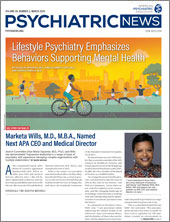One of the first courses that John Luo, M.D., taught some 25 years ago was a technology-themed course in which he taught physicians how to use Palm Pilots in their work.
“When I was a resident, these instruments were big deals; I could add the whole DSM to my Palm Pilot,” said Luo, a professor of psychiatry and director of psychiatry resident training at the University of California, Irvine.
“Technology in medicine has come a long way since then,” continued Luo, who is the chair of the Subcommittee on Technology for APA’s 2024 Annual Meeting. “Video calls are seamless, electronic prescribing is standard, and today’s discussions are about artificial intelligence.” In fact, several sessions at this year’s meeting will tackle the emerging power that is artificial intelligence (AI), part of the robust Technology Track featuring more than 30 sessions across multiple formats, including courses, invited sessions, resident-fellow sessions, and Innovation Zone presentations.
Among the AI-related sessions:
•
Health Equity and Digital Divide in the Age of Augmented Intelligence: Darlene King, M.D., Julia Tartaglia, M.D., Morkeh Blay-Tofey, M.D., M.B.A., and Jessica Thackaberry, M.D.
•
The Ethics of AI: Dora Calott Wang, M.D.
•
How Can AI Be Used to Combat Addictions in Communities of Color? Jacques Ambrose, M.D.
•
AI/Machine Learning and Predicting Suicide: Jordan Smoller, M.D.
Luo said that the interface of technology and addiction will be another focus of the track, in keeping with this year’s meeting theme, “Confronting Addiction From Prevention to Recovery.” Highlighting this area will be a lecture on technological addictions from APA President Petros Levounis, M.D., M.A., and a presidential session on TikTok and Instagram addiction in children presented by Ashvin Sood, M.D., and Mark Potenza, Ph.D., M.D.
Technology also has a role in combatting addiction, and Luo said that there will be sessions examining strategies like online support groups and online cognitive-behavioral therapy. Sessions on the therapeutic use of digital tools like mobile apps or virtual reality for other psychiatric disorders will also be on this year’s agenda. And for attendees interested in more established technologies like electronic health records and telemedicine, Luo said there will be multiple session options as well.
For his own part, Luo will participate in a fireside chat moderated by Wang, an associate clinical professor of psychiatry at the University of New Mexico and president of APA’s Caucus of Asian American Psychiatrists. Luo—who has long been interested in electronic documentation and other areas of clinical informatics—will reflect on the changing digital landscape over his 30-year career as a student and teacher.
“My fantasy years ago was that technology would free up more time for psychiatrists to spend with patients,” Luo said. “Unfortunately, that hasn’t come true yet.” He said technology has been helpful in several areas, like dictation software, but it has also caused new burdens. Reports have shown that automated
health record alerts are contributing to physician fatigue, while increased telemedicine uptake has added to physicians’ work hours.
Technology has also impacted patients as more of their health information goes online. “Our society has become a bit more comfortable with sharing, but many patients are still uncomfortable that all their health information is so accessible,” he said. “At the end of the day, technological progress has been a good thing for psychiatry, but it is a balancing act of benefits and risks.” ■
